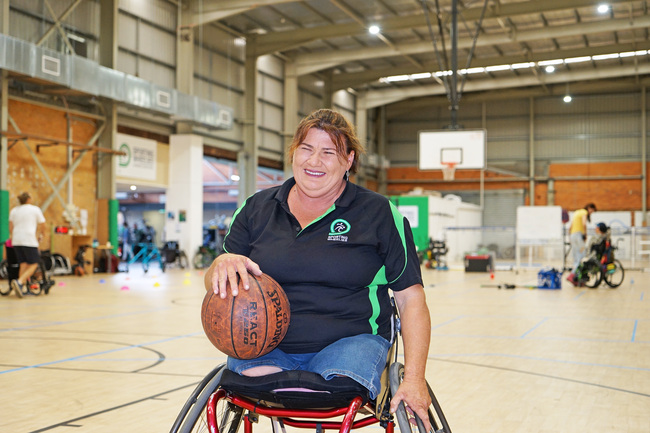Wendy Passfield’s life doesn’t follow a straight track.
Like most, there have been twists and turns, bumps in the road, soaring highs and crushing lows.
But her life remains less certain than most.
Today, she smiles brightly and rolls confidently onto the basketball court, coaching, playing, and laughing with the same joy she once found in netball as a young girl growing up in Logan.
But tomorrow, she could be in a hospital bed – fighting off a dangerous, lingering infection that has haunted her for nearly two decades.
That’s the simple, cruel reality of her life. But if you think she lets it hold her back, think again.
The Crestmead mum-of-two knows better than anyone that life isn’t always, if ever, fair.
Eighteen years ago, while delivering her son via cesarean section, Ms Passfield was dropped from the operating table.
The fall broke her leg. But things only got worse from there.
When hospital staff pinned and plated the break, Ms Passfield contracted an infection.
To save her life, the leg was amputated. But her other leg also required surgery.
Ms Passfield was facing one in 500,000 odds of the infection jumping to her remaining leg.
“Unfortunately, that was the case,” Ms Passfield said.
More than 100 surgeries later, both her legs were gone.
They were replaced by a pain – both physical and emotional – that haunted Ms Passfield for years.
There was little to no support for Ms Passfield when she arrived home from the hospital. The NDIS had not yet been introduced.
Ms Passfield’s family and friends did what they could to support her. But she returned home to grapple with a severe injury and the responsibility of caring for two children.
“When I first broke my leg, I came home with the newborn baby, a nine-year-old with cerebral palsy, and a leg in plaster,” she said.
It was an “ugly” period of her life, with daily, chronic pain.
Naturally, pain medications became her lifeline. She formed a dependency on the relief they offered.
But eventually they stopped working.
At a family reunion more than a decade after the initial injury, Ms Passfield felt she’d embarrassed herself and began to realise she “was out of control”.
“I hit rock bottom and knew something had to change,” Ms Passfield said.
She stopped taking pain-relief medication. However, she didn’t tell her doctors.
“I just went cold turkey, and it was probably the worst three months of my life,” Ms Passfield said.
“I couldn’t go on like that. My kids deserved better than that.”
Four years ago, Ms Passfield found a new prescription for her pain: sport.
Sometimes that means going to the gym three times a day. But most of the time, it comes in the form of basketball.
She said the exercise and routine distracted her brain and occupied her body.
It has helped her lose weight, boost her fitness, and improve her outlook on life.
“I’ll get in my basketball chair, I’ll go to the gym, and I’ll push myself to try and ignore the pain and work through it that way.”
As a child growing up in Logan, Ms Passfield always enjoyed playing sports. Particularly netball and athletics.
So in 2021, she started participating in wheelchair basketball matches run by Sporting Wheelies, a charity that provides opportunities for people living with disabilities to participate and thrive in sports – inclusive of everyone.
After playing regularly in wheelchair basketball games and volunteering to assist the coaching staff, Sporting Wheelies offered Ms Passfield a job.
Ms Passfield now runs a program called Raising the Bar, an inclusive school sports program where she travels to schools with wheelchairs and allows students to experience being in one.
Her official title in the role is ‘Game Changer’.
Ms Passield and her team also share their experiences of living with a disability.
“We go into schools or have corporate events where we put people in wheelchairs, and we play activities and a bit of wheelchair basketball, and then we tell them our stories and about our disability,” she said.
“It’s quite eye-opening to a lot of able-bodied kids to go out there and put them in a wheelchair.
“We get feedback from the schools all the time about how the level of empathy has changed.”
Ms Passfield plays for Adelaide Thunder, who compete in the wheelchair basketball nationals league.
She trains with the Brisbane men’s premier league team, the Spartans, at Corina and flies down to Adelaide when she can to train with her team.
Ms Passfield flies to cities and towns all over the country to play in matches. Later this year, Melbourne and Perth are on the agenda.
In the last month, Ms Passfield has set up a new wheelchair basketball social program in Logan.
Previously, no programs existed like this, and Ms Passfield wants to make the sport accessible to everyone, particularly her home community.
She continues to manage the infection from 18 years ago, as it occasionally flares up.
“The infection… gets quite worrisome sometimes,” she said.
“I’ll be on antibiotics for the rest of my life.
“You can’t plan anything. You can’t plan a life. I’m fine today, I’m at work, but tomorrow I could be in the hospital losing my leg. That’s how fast it comes on, and there’s nothing you can do.”



